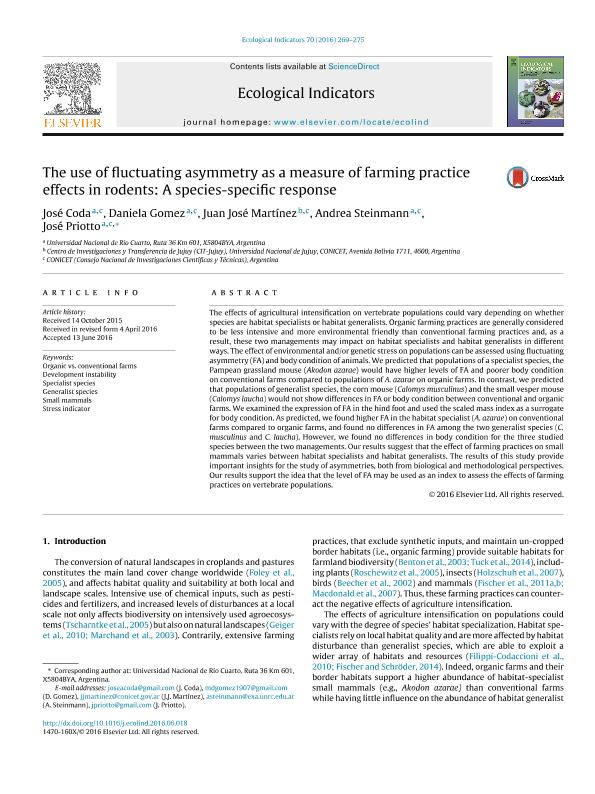Mostrar el registro sencillo del ítem
dc.contributor.author
Coda, José Antonio

dc.contributor.author
Gomez, Maria Daniela

dc.contributor.author
Martínez, Juan José

dc.contributor.author
Steinmann, Andrea Rosa

dc.contributor.author
Priotto, Jose Waldemar

dc.date.available
2018-04-25T14:32:10Z
dc.date.issued
2016-11
dc.identifier.citation
Coda, José Antonio; Gomez, Maria Daniela; Martínez, Juan José; Steinmann, Andrea Rosa; Priotto, Jose Waldemar; The use of fluctuating asymmetry as a measure of farming practice effects in rodents: A species-specific response; Elsevier Science; Ecological Indicators; 70; 11-2016; 269-275
dc.identifier.issn
1470-160X
dc.identifier.uri
http://hdl.handle.net/11336/43433
dc.description.abstract
The effects of agricultural intensification on vertebrate populations could vary depending on whether species are habitat specialists or habitat generalists. Organic farming practices are generally considered to be less intensive and more environmental friendly than conventional farming practices and, as a result, these two managements may impact on habitat specialists and habitat generalists in different ways. The effect of environmental and/or genetic stress on populations can be assessed using fluctuating asymmetry (FA) and body condition of animals. We predicted that populations of a specialist species, the Pampean grassland mouse (Akodon azarae) would have higher levels of FA and poorer body condition on conventional farms compared to populations of A. azarae on organic farms. In contrast, we predicted that populations of generalist species, the corn mouse (Calomys musculinus) and the small vesper mouse (Calomys laucha) would not show differences in FA or body condition between conventional and organic farms. We examined the expression of FA in the hind foot and used the scaled mass index as a surrogate for body condition. As predicted, we found higher FA in the habitat specialist (A. azarae) on conventional farms compared to organic farms, and found no differences in FA among the two generalist species (C. musculinus and C. laucha). However, we found no differences in body condition for the three studied species between the two managements. Our results suggest that the effect of farming practices on small mammals varies between habitat specialists and habitat generalists. The results of this study provide important insights for the study of asymmetries, both from biological and methodological perspectives. Our results support the idea that the level of FA may be used as an index to assess the effects of farming practices on vertebrate populations.
dc.format
application/pdf
dc.language.iso
eng
dc.publisher
Elsevier Science

dc.rights
info:eu-repo/semantics/openAccess
dc.rights.uri
https://creativecommons.org/licenses/by-nc-nd/2.5/ar/
dc.subject
Development Instability
dc.subject
Generalist Species
dc.subject
Organic Vs. Conventional Farms
dc.subject
Small Mammals
dc.subject
Specialist Species
dc.subject
Stress Indicator
dc.subject.classification
Otras Ciencias Biológicas

dc.subject.classification
Ciencias Biológicas

dc.subject.classification
CIENCIAS NATURALES Y EXACTAS

dc.title
The use of fluctuating asymmetry as a measure of farming practice effects in rodents: A species-specific response
dc.type
info:eu-repo/semantics/article
dc.type
info:ar-repo/semantics/artículo
dc.type
info:eu-repo/semantics/publishedVersion
dc.date.updated
2018-04-24T15:15:32Z
dc.journal.volume
70
dc.journal.pagination
269-275
dc.journal.pais
Países Bajos

dc.journal.ciudad
Amsterdam
dc.description.fil
Fil: Coda, José Antonio. Universidad Nacional de Río Cuarto; Argentina. Consejo Nacional de Investigaciones Científicas y Técnicas; Argentina
dc.description.fil
Fil: Gomez, Maria Daniela. Universidad Nacional de Río Cuarto; Argentina. Consejo Nacional de Investigaciones Científicas y Técnicas; Argentina
dc.description.fil
Fil: Martínez, Juan José. Consejo Nacional de Investigaciones Científicas y Técnicas. Centro de Investigaciones y Transferencia de Jujuy. Universidad Nacional de Jujuy. Centro de Investigaciones y Transferencia de Jujuy; Argentina
dc.description.fil
Fil: Steinmann, Andrea Rosa. Universidad Nacional de Río Cuarto; Argentina. Consejo Nacional de Investigaciones Científicas y Técnicas; Argentina
dc.description.fil
Fil: Priotto, Jose Waldemar. Universidad Nacional de Río Cuarto; Argentina. Consejo Nacional de Investigaciones Científicas y Técnicas; Argentina
dc.journal.title
Ecological Indicators

dc.relation.alternativeid
info:eu-repo/semantics/altIdentifier/doi/http://dx.doi.org/10.1016/j.ecolind.2016.06.018
dc.relation.alternativeid
info:eu-repo/semantics/altIdentifier/url/https://www.sciencedirect.com/science/article/pii/S1470160X16303181
Archivos asociados
